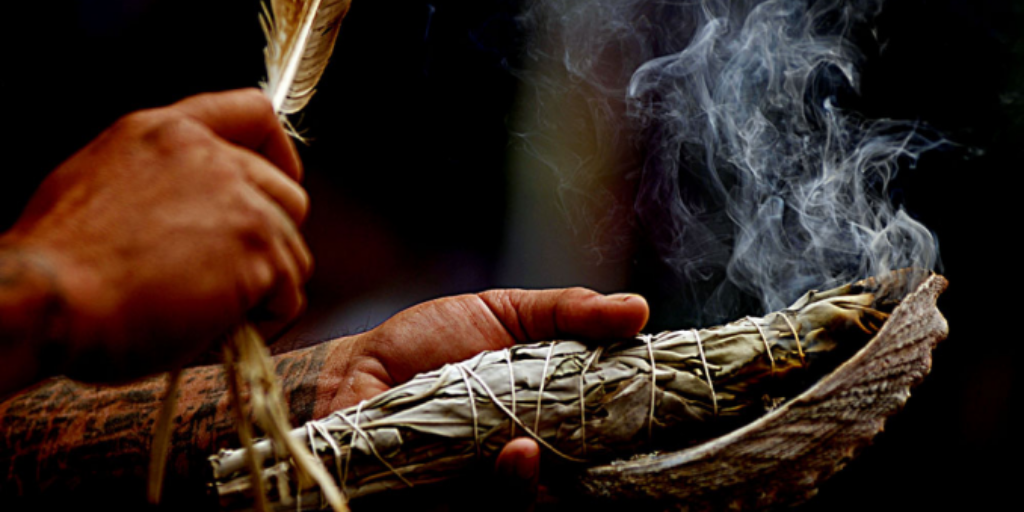Offer
Provide additional details about the offer you're running.

Written by alternativemediasyndicate.com
I strike a match and hold it up to a bundle of dried sage. A flame ignites, and I let it burn for a moment, then blow it out. A cleansing dark blue-to-white ombré of smoke swirls around the room, purifying the space. And I don’t mean that energetically or symbolically. As it turns out, smudging—as the ancient practice of burning sage and other herbs is called—appears to have antiseptic, bacteria-killing properties.
The results of a study that set out to examine the potential uses of smudging in Western medicine were published in a 2006 scientific paper titled “Medicinal Smokes,” in the Journal of Ethnopharmacology.The researchers behind the study undertook it based on the fact that “All through time, humans have used smoke of medicinal plants to cure illness,” as the study’s abstract states.
According to the abstract, “All through time, humans have used smoke of medicinal plants to cure illness. To the best of our knowledge, the ethnopharmacological aspects of natural products’ smoke for therapy and health care have not been studied. … The advantages of smoke-based remedies are rapid delivery to the brain, more efficient absorption by the body and lower costs of production.” The practice of smudging is an ancient one, but it has never gone away. People all over the world (over five continents, according to the study) still burn sage and other herbs, usually for spiritual purposes like “energetic cleansing,” or to call on the energetic properties of a given plant.
It drew on research from 50 countries around the globe and found that according to various human medicinal practices dating back to ancient civilization, “inhalation of smoke is typically used in the treatment of pulmonary and neurological disorders and directed smoke in localized situations, such as dermatological and genito-urinary disorders.” However, the key finding was that in those traditions, “ambient smoke is not directed at the body at all but used as an air purifier.”
Therefore, a follow-up paper was published in the same journal eleven months later, examining those air purifying potentials of smoke, or smudging.
That paper concludes that, “medicinal smoke reduces airborne bacteria” (this is actually the title of the paper’s abstract). This study observed the effects of “burning wood and a mixture of odoriferous and medicinal herbs” on the “aerial bacterial population” in a closed room for 60 minutes. The results showed 94 percent of the aerial bacteria were eliminated. The abstract also states that “The ability of the smoke to purify or disinfect the air and to make the environment cleaner was maintained up to 24hin the closed room.”
Ultimately, the research concluded that in addition to potential health benefits, smudging is a viable, and strong, antiseptic. The final sentence in the study’s abstract states, “We have demonstrated that using medicinal smoke it is possible to completely eliminate diverse plant and human pathogenic bacteria of the air within confined space.”
As our overuse of antibiotics and cleaning products has resulted in the threat of “super bugs” that have become immune to our pharmaceuticals and other chemicals, it is time we looked more closely at the alternatives. It is encouraging that natural remedies as simple as lighting a bundle of plants on fire, might actually be viable. Other research and scientific study has shown us that essential oils could potentially replace antibiotics, and as my friend and fellow journalist Elizabeth Limbach points out in her detailed article on the topic, “medicinal applications of essential oils are currently being studied in the United States, Europe, Japan, Canada, Australia and India.”
The issue is a lack of research, which is likely due to a combination of Big Pharma’s overwhelming control over the medicine and health-care space, as well as a societal stigma that surrounds traditional medicine practices. An article on smudging published last year on TheSpiritScience.net explained this ugly phenomenon well, stating:
"Of course, there are skeptics who belittle the practice as unscientific and akin to magic. The practice has a negative association to a form of cultural imperialism, where traditions of dwindling indigenous populations are co-opted by the descendants of those who more-or-less conquered them."
Additional research is necessary before we have conclusive evidence showing us exactly how smudging, essential oils and other herb-based remedies might come to play in the future of Western medicine. But what we’ve seen so far suggests human healing practices might just come full-circle.